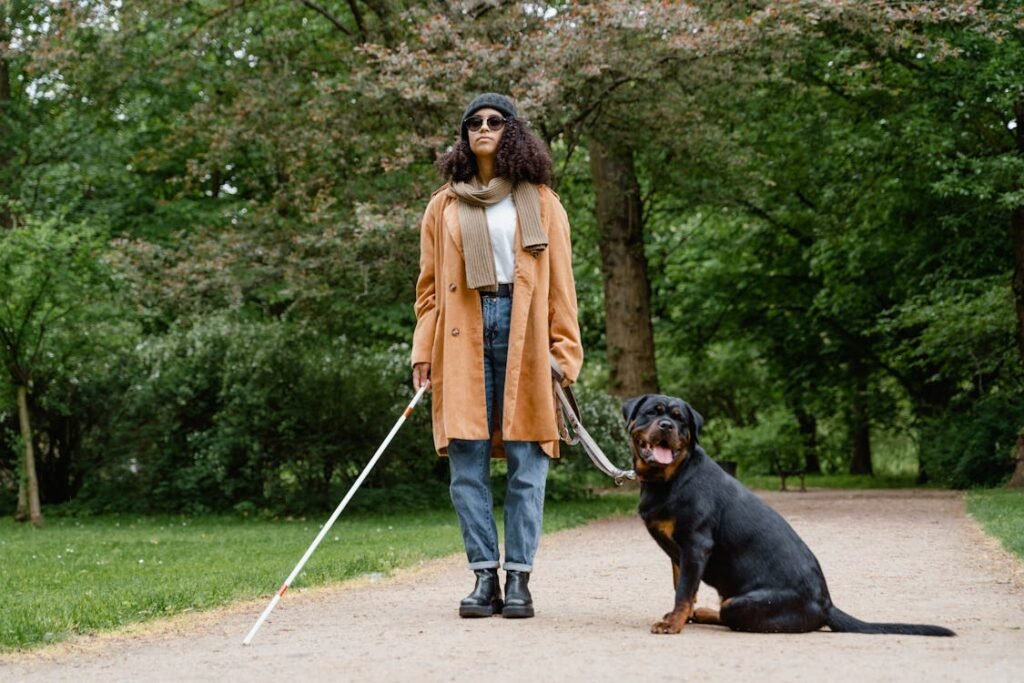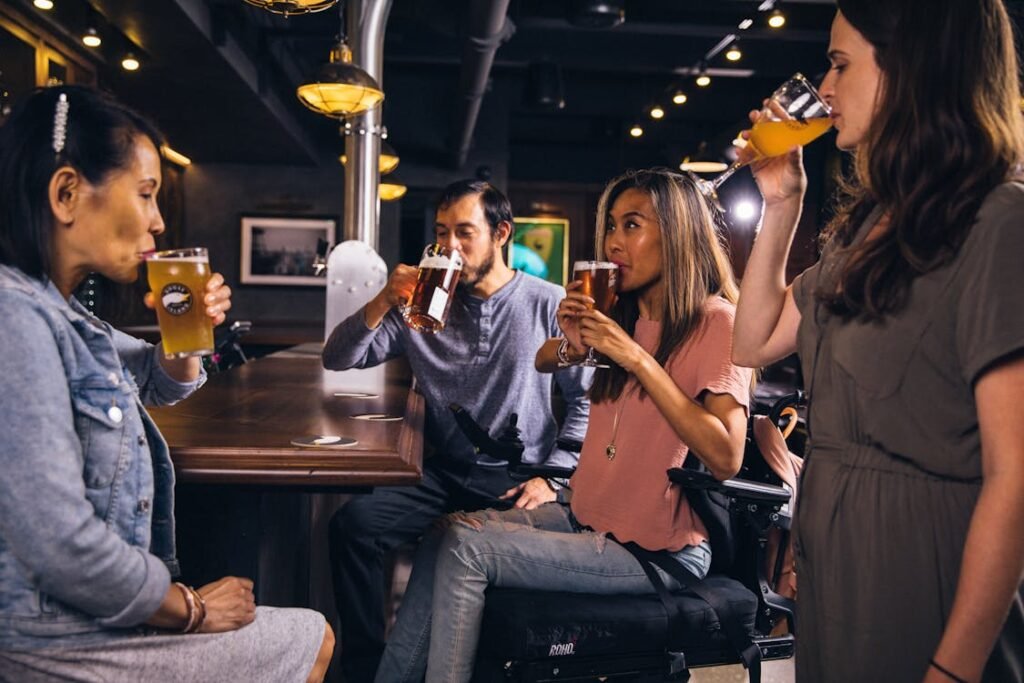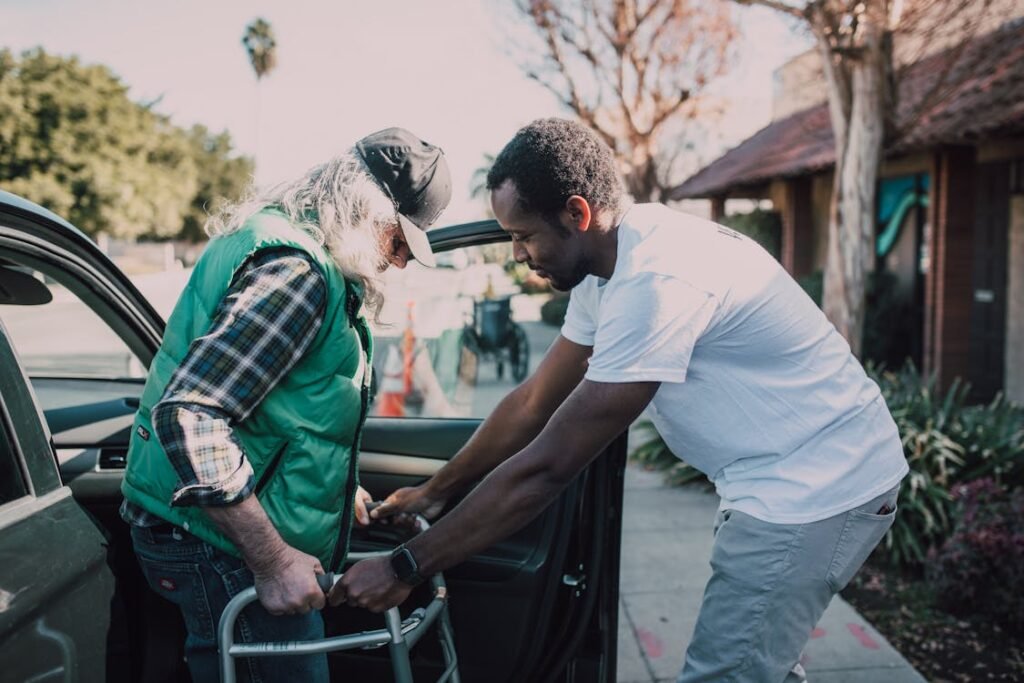Disability advocacy in India is more important than ever. Millions of people with disabilities face daily challenges in accessibility, employment, healthcare, and social inclusion. While laws like the Rights of Persons with Disabilities (RPwD) Act exist, real change happens when individuals and communities take action.
If you are passionate about creating an inclusive society, you can play a role in making a difference. Whether you are an individual, part of an organization, or simply someone who wants to support disability rights, there are many ways to contribute. This article will guide you through practical steps you can take to become an advocate for disability rights in India.

Understanding the Challenges Faced by People with Disabilities in India
Before getting involved in disability advocacy, it is important to understand the real struggles people with disabilities face daily.
India has made progress in disability rights, but many barriers still exist in accessibility, employment, education, and healthcare. Without addressing these issues, true inclusion cannot be achieved.
Accessibility and Infrastructure
One of the biggest challenges is the lack of accessible infrastructure. Despite government regulations requiring public places to be disability-friendly, many buildings, roads, and public transport systems remain inaccessible.
Many government offices, schools, and even hospitals lack ramps, elevators, or wheelchair-friendly restrooms. Public transport is another major issue, as buses and trains often do not accommodate people with mobility impairments.
Many individuals with disabilities struggle to move around freely because footpaths are uneven, roads lack proper crossings, and signage is often not disability-friendly.
Even technology, such as websites and mobile applications, is often designed without accessibility features, making it hard for visually or hearing-impaired individuals to access basic services.
Employment Barriers
Unemployment and workplace discrimination remain major challenges for people with disabilities in India. While companies are encouraged to hire individuals with disabilities, many hesitate due to stereotypes and a lack of awareness.
Job seekers with disabilities often find it difficult to secure employment, as workplaces are not always accommodating. Some companies assume that hiring people with disabilities will be expensive or complicated, which leads to exclusion from job opportunities.
Even when individuals with disabilities secure jobs, they sometimes face discrimination, lack of career growth, and inadequate workplace accommodations.
Many organizations do not provide accessible workspaces, assistive technology, or flexible work options. This results in many skilled and talented individuals being denied equal opportunities to build a successful career.
Education and Inclusion
Education is a fundamental right, yet many children with disabilities are still unable to access quality education. Schools often lack proper facilities, trained teachers, and inclusive learning materials.
Many children with disabilities are either forced to attend special schools or drop out entirely due to the lack of support in mainstream education.
Even when they are enrolled in schools, they often face bullying, discrimination, and isolation from their peers. Teachers may not be trained to support students with disabilities, and learning materials may not be available in formats such as braille or sign language.
This creates a gap in education and makes it harder for children with disabilities to reach their full potential.
Healthcare and Social Stigma
Access to healthcare is another serious issue. Many hospitals and clinics do not have specialized medical professionals who understand the needs of people with disabilities.
Basic medical care can become a challenge due to inaccessible facilities and a lack of disability-friendly healthcare services.
Additionally, there is a deep-rooted social stigma surrounding disability in India. Many people with disabilities face discrimination from society, including within their own families.
They are often seen as dependent or incapable, which affects their confidence and mental well-being. Many individuals struggle with self-acceptance due to societal attitudes that reinforce negative stereotypes.
The Need for Stronger Advocacy
To bring real change, strong advocacy is necessary. While government policies and laws exist, implementation remains weak in many areas. Disability rights organizations and activists work hard to push for better policies, but more voices need to be involved to create lasting impact.
Understanding these challenges is the first step in making a difference. Advocating for disability rights means ensuring that people with disabilities have equal opportunities, dignity, and access to the same resources as everyone else.
Whether through raising awareness, supporting inclusive policies, or working with organizations, every effort counts in creating a more inclusive India.

How to Get Involved in Disability Advocacy in India
Now that we understand the challenges faced by people with disabilities in India, the next step is taking action. Advocacy is not just about raising awareness; it’s about creating real change in policies, infrastructure, and societal attitudes.
Whether you are an individual, part of an organization, or someone passionate about making a difference, there are many ways to contribute.
Educate Yourself and Others
The first step to becoming an advocate is educating yourself about disability rights, policies, and best practices.
Read about the Rights of Persons with Disabilities (RPwD) Act, 2016, which protects the rights of individuals with disabilities in India. Understanding these legal protections will help you advocate for better implementation.
Once you have gained knowledge, share it with others. Many people are unaware of the struggles faced by individuals with disabilities, and spreading awareness is a powerful tool for change.
Talk to friends, family, and colleagues about accessibility and inclusion. Social media is another great platform to share information, personal stories, and updates on disability rights.
Support and Volunteer with Organizations
Many NGOs and advocacy groups in India are working towards disability rights, accessibility, and inclusion. Volunteering with these organizations is a great way to make a tangible impact.
Groups like the National Centre for Promotion of Employment for Disabled People (NCPEDP), Enable India, and various local NGOs work to support employment, education, and accessibility for individuals with disabilities.
You can volunteer by helping with events, offering professional skills, or assisting in outreach programs. If you have expertise in areas such as law, technology, or healthcare, your skills can be especially valuable.
Many organizations also need support in fundraising and public relations, which can help them expand their reach.
Advocate for Inclusive Workplaces
If you work in a company, you can push for more inclusive hiring practices. Encourage your employer to hire people with disabilities and create an accessible workplace.
Talk to HR departments about implementing disability-friendly policies, such as flexible work hours, assistive technology, and accessible office spaces.
If you are a business owner, consider making your business more inclusive by hiring individuals with disabilities.
Creating an environment where people with disabilities feel valued and included will not only benefit them but also bring diverse perspectives and talents to your organization.
Make Public Spaces More Accessible
One of the biggest barriers for people with disabilities is the lack of accessibility in public spaces. You can advocate for better infrastructure in your community by reaching out to local authorities, writing petitions, and engaging in discussions about accessibility.
If you see a public place that lacks ramps, elevators, or accessible restrooms, report it to the concerned authorities. Many local governments have departments responsible for implementing accessibility regulations. By actively speaking up, you can push for real changes in your city or town.
Push for Better Policies and Implementation
Laws like the RPwD Act provide strong legal protection for people with disabilities, but implementation remains weak in many parts of India.
As an advocate, you can engage with policymakers to push for better enforcement of existing laws and the introduction of new policies that improve accessibility, education, and employment opportunities.
Writing to your local representatives, participating in disability rights campaigns, and attending public discussions can make a difference.
Many disability rights groups organize campaigns and petitions to demand better services. Adding your voice to these initiatives strengthens the movement and increases the chances of success.
Promote Inclusive Education
Education is one of the most powerful tools for change. If you are a teacher, parent, or involved in the education sector, you can advocate for better inclusion in schools. Encourage schools to provide resources like braille textbooks, sign language interpreters, and special educators.
If you notice a lack of support for students with disabilities, speak to school administrators and push for better accommodations. Inclusive education benefits not only children with disabilities but also helps create a more understanding and empathetic society.
Use Technology to Drive Change
Technology can be a game-changer for disability advocacy. Many apps, websites, and tools are designed to help people with disabilities navigate daily life more easily.
Promoting accessible technology and supporting startups that create inclusive solutions can be a great way to contribute.
You can also leverage social media and online platforms to share awareness campaigns, host discussions, and highlight the need for better accessibility. Hashtags, online petitions, and digital campaigns have the power to reach thousands of people and drive meaningful change.
Be an Ally in Everyday Life
Sometimes, the smallest actions make the biggest impact. Treat people with disabilities with respect and dignity. Offer help when needed but avoid making assumptions about their abilities. If you notice discrimination or exclusion, speak up.
Encourage inclusive conversations and challenge stereotypes. Representation matters, so support films, books, and media that showcase positive and accurate portrayals of people with disabilities.
When you advocate for inclusion in everyday life, you help change attitudes and perceptions in society.
The Power of Collective Effort
Advocacy is not about one person making a difference—it’s about collective effort. When individuals, organizations, and policymakers work together, change happens faster. Even small actions, when combined, lead to significant improvements in accessibility and inclusion.
By taking steps to educate yourself, support organizations, push for policy changes, and promote inclusion in your personal and professional life, you can help build a more accessible and equitable India.
Every voice counts, and your efforts, no matter how small, can create a meaningful impact in the lives of people with disabilities.

The Role of Businesses and Corporations in Disability Advocacy
While individuals play a crucial role in driving disability advocacy, businesses and corporations have an even greater responsibility. A truly inclusive society cannot exist unless the corporate world actively embraces accessibility, equal opportunities, and workplace inclusivity.
Companies that prioritize disability inclusion not only contribute to social progress but also benefit from a diverse workforce, innovative ideas, and a more positive brand reputation.
Creating Inclusive Workplaces
One of the most impactful ways businesses can support disability advocacy is by creating inclusive workplaces. This starts with hiring people with disabilities and ensuring they have the same opportunities for growth as other employees.
Many businesses hesitate to hire individuals with disabilities due to myths about productivity and accommodation costs. However, studies have shown that employees with disabilities bring strong problem-solving skills, resilience, and dedication to the workplace.
Companies should implement disability-friendly policies, such as offering flexible work arrangements, remote work options, and assistive technologies.
Workplace accessibility must also be prioritized by ensuring that offices have ramps, elevators, braille signage, and accessible restrooms. If an employee requires additional accommodations, employers should be open to discussions and provide necessary support without hesitation.
Encouraging Supplier Diversity
Beyond internal hiring, companies can also support disability advocacy by working with businesses that are owned or operated by people with disabilities.
This practice, known as supplier diversity, helps promote financial independence for individuals with disabilities and strengthens their role in the economy.
Organizations can actively seek partnerships with disability-led businesses, inclusive startups, and social enterprises that focus on accessibility and assistive technology.
By doing so, businesses help create a more sustainable economic ecosystem where people with disabilities are not just employees but also business owners and decision-makers.
Promoting Accessibility in Products and Services
A company’s impact on disability advocacy extends beyond its internal policies. Businesses should design their products and services with accessibility in mind.
Whether it’s a physical product, a digital platform, or a service, ensuring accessibility from the start benefits a wider audience.
For instance, banks and financial institutions should provide accessible banking services, such as braille statements, talking ATMs, and mobile apps compatible with screen readers.
Similarly, e-commerce platforms should ensure their websites are accessible to people with visual impairments, while restaurants and retail stores should provide wheelchair-friendly entrances and menus in accessible formats.
When businesses make accessibility a priority, they do more than just comply with regulations—they send a strong message that they value all customers equally.
Engaging in Corporate Social Responsibility (CSR) Initiatives
Corporate Social Responsibility (CSR) initiatives provide businesses with an opportunity to invest in disability advocacy programs. Companies can sponsor skill development programs, donate assistive devices, or support NGOs working in the field of disability rights.
Many organizations already have CSR budgets allocated for social initiatives, and directing some of these resources towards disability advocacy can have a long-lasting impact.
Businesses can also organize awareness campaigns, disability inclusion training for employees, and mentorship programs for individuals with disabilities.
These efforts not only benefit the community but also create a more inclusive corporate culture that values diversity and equal opportunity.
Raising Awareness and Driving Policy Change
Large corporations have the power to influence policies and societal attitudes. Businesses can use their platforms to raise awareness about disability rights, accessibility, and inclusion.
Partnering with disability advocacy organizations, sponsoring campaigns, and participating in policy discussions can help push for stronger legal protections and better implementation of disability-friendly policies.
Companies should also advocate for government incentives that encourage businesses to hire individuals with disabilities.
By actively engaging with policymakers, industry leaders can help shape a more inclusive economic environment that benefits both businesses and individuals with disabilities.
The Business Case for Disability Inclusion
Apart from the moral and ethical reasons for supporting disability advocacy, businesses also have a strong financial incentive to become more inclusive. A diverse and inclusive workforce fosters innovation, increases employee engagement, and improves overall company culture.
Additionally, businesses that prioritize accessibility can tap into a larger customer base, as people with disabilities—and their families—represent a significant consumer market.
By making inclusivity a core part of their business strategy, companies can not only drive social change but also improve their long-term success.
A workplace that embraces diversity, accessibility, and equal opportunities is one that attracts top talent, earns customer loyalty, and remains competitive in an evolving marketplace.
A Call to Action for Businesses
It is time for businesses in India to take a proactive role in disability advocacy. Hiring individuals with disabilities, ensuring accessibility in workplaces, and developing inclusive products and services are not just responsibilities—they are opportunities to create meaningful impact.
By prioritizing accessibility and inclusion, companies can lead by example and inspire others to do the same.
Disability advocacy is not just about compliance with laws; it is about building a society where everyone, regardless of their abilities, has equal opportunities to succeed.
Businesses have the power to drive this change, and those that step up will not only make a difference but also thrive in an inclusive and diverse future.

The Role of Government and Policy in Disability Advocacy
While individual efforts and corporate initiatives are crucial, real and lasting change requires strong government policies and proper enforcement.
The Indian government has made progress in disability rights over the years, but gaps still remain in implementation, accessibility, and awareness. Advocating for stronger policies and better execution is one of the most impactful ways to support disability inclusion.
The Rights of Persons with Disabilities (RPwD) Act, 2016
India’s most comprehensive law protecting the rights of people with disabilities is the Rights of Persons with Disabilities (RPwD) Act, 2016.
This legislation replaced the earlier Persons with Disabilities Act of 1995 and expanded the definition of disability from seven to 21 recognized conditions, including cerebral palsy, autism, and multiple sclerosis.
The law guarantees rights in areas like education, employment, healthcare, and accessibility. It mandates that government and private institutions provide reasonable accommodations, such as ramps, elevators, and assistive technology, to make spaces inclusive.
It also requires public transport, websites, and digital platforms to be accessible. Employers must not discriminate against job seekers with disabilities and should provide necessary workplace accommodations.
Despite these legal protections, many government buildings, workplaces, and schools still do not comply with accessibility requirements.
This is where advocacy plays a crucial role—citizens, activists, and disability rights groups must hold authorities accountable and push for better implementation.
Challenges in Policy Implementation
Even though strong disability laws exist in India, enforcement is weak in many areas. Many public and private establishments still do not follow accessibility guidelines, and people with disabilities continue to face discrimination in education, employment, and healthcare.
One major issue is lack of awareness and training among government officials and policymakers. Many local authorities do not fully understand disability rights, leading to slow implementation of policies.
Corruption and bureaucratic delays also hinder progress, making it difficult for people with disabilities to access government benefits and services.
Another challenge is inconsistent accessibility standards across different states and cities. While some urban areas have started improving accessibility, rural areas still lack basic infrastructure for people with disabilities.
Many government schemes do not reach those who need them the most, particularly in small towns and villages.
Advocating for Stronger Implementation
Advocacy groups, NGOs, and individuals can play a major role in pushing for better enforcement of disability laws. Here’s how you can get involved:
- File complaints and petitions when you see violations of disability rights. Many government offices have grievance redressal mechanisms where you can report inaccessible public places or discrimination.
- Engage with policymakers by attending public hearings, participating in disability rights discussions, and writing to elected representatives to demand better implementation of the RPwD Act.
- Use legal action when necessary. The law allows people with disabilities to take legal action against discrimination and accessibility violations. Advocacy groups can assist in filing public interest litigations (PILs) to demand action.
Government Schemes and Benefits for People with Disabilities
The Indian government has introduced several schemes to support individuals with disabilities, but many people are unaware of them. Advocates can help by spreading awareness about these programs and ensuring that eligible individuals receive the benefits they deserve.
Some key government schemes include:
- Sugamya Bharat Abhiyan (Accessible India Campaign): A nationwide initiative to improve accessibility in public spaces, government buildings, transportation, and digital platforms.
- Divyangjan Swavalamban Yojana: Provides financial assistance and loans to individuals with disabilities to start their own businesses.
- Disability Pension Schemes: Various central and state government pension schemes offer financial aid to individuals with disabilities.
- Scholarships for Students with Disabilities: Programs like the National Scholarship Scheme support students with disabilities by covering education costs.
Many of these schemes remain underutilized due to lack of awareness and bureaucratic hurdles. Disability advocates can help by educating people about these programs and assisting them in the application process.
Pushing for More Inclusive Policies
While existing laws and schemes provide a strong foundation, more needs to be done to create a truly inclusive society. Disability advocates can push for policy improvements in key areas such as employment, education, healthcare, and social security.
For example, India needs stronger workplace inclusion policies that go beyond hiring quotas and focus on real career development for people with disabilities. There should also be better incentives for private companies to create inclusive workplaces.
In the education sector, mainstream schools should receive more support to accommodate students with disabilities, including funding for special educators, assistive technology, and inclusive curricula.
Healthcare policies must also improve to ensure better medical care, early intervention programs, and mental health support for people with disabilities. Many hospitals still lack accessible facilities and trained professionals who understand disability-specific needs.
Holding Authorities Accountable
Disability advocacy is not just about pushing for new policies—it’s also about ensuring that existing policies are properly implemented. One of the most effective ways to do this is by holding government agencies accountable.
Citizens and organizations can do this by:
- Tracking government spending on disability programs to ensure funds are used effectively.
- Requesting accessibility audits of public buildings and infrastructure.
- Participating in policy discussions and consultations to ensure that disability voices are heard in decision-making.
By actively engaging with the government, advocacy groups can ensure that disability rights are not just written in law but also put into practice.
The Way Forward
The Indian government has taken positive steps towards disability inclusion, but true progress requires continuous effort from both policymakers and citizens.
Disability advocacy must focus on better enforcement, stronger policies, and greater awareness to build an inclusive India where everyone has equal opportunities.
If more people raise their voices and demand action, real change is possible. Governments respond to public pressure, and when enough people demand accessibility, inclusion, and equal rights, authorities will be forced to act.
Advocacy is a powerful tool, and when used effectively, it can create a better future for individuals with disabilities across the country.

The Power of Community in Disability Advocacy
While laws, government policies, and corporate efforts play a major role in disability inclusion, real change often starts at the community level.
A strong and supportive community can break down barriers, change mindsets, and create opportunities for individuals with disabilities. Advocacy at the grassroots level is just as important as national-level policy changes, as it impacts daily life in a more direct and personal way.
Building Inclusive Communities
An inclusive community is one where people with disabilities are not just accommodated but fully integrated into everyday life. This means ensuring accessibility in public places, schools, workplaces, and recreational spaces.
It also means fostering a culture of understanding and respect, where people with disabilities are seen as equal members of society rather than as individuals who need special treatment.
Communities can take simple but powerful steps toward inclusivity. Local businesses can ensure that their shops, restaurants, and offices are accessible.
Schools and colleges can encourage students to learn about disability rights and promote inclusive activities. Neighborhoods can work together to identify and remove barriers that prevent individuals with disabilities from participating fully in society.
Changing Social Attitudes
One of the biggest barriers to inclusion is the social stigma surrounding disability. Many people in India still see disability as a weakness, something to be hidden or pitied.
This mindset creates an environment where people with disabilities struggle for equal opportunities. Changing these attitudes requires education, awareness, and representation.
Parents and teachers play a crucial role in shaping how children view disability. Teaching children about inclusion from a young age helps build a future where disability is seen as a normal part of human diversity rather than as a limitation.
Schools can organize programs where students interact with individuals with disabilities to learn about their experiences and abilities.
Media and entertainment also play a powerful role in shaping social attitudes. Films, TV shows, and advertisements should feature people with disabilities in strong, independent roles, rather than portraying them as helpless or dependent.
When society starts seeing people with disabilities as capable and empowered, discrimination and stigma begin to fade.
Creating Local Advocacy Networks
While national-level advocacy efforts are important, local advocacy often brings the most immediate results. Small groups of committed individuals can make a big difference in improving accessibility and inclusion within their own communities.
For example, if a local park is not wheelchair accessible, a group of residents can work together to request ramps and pathways. If a school does not provide accommodations for students with disabilities, parents and teachers can push for better policies.
Even something as simple as ensuring that local events have sign language interpreters or braille materials can go a long way in making a community more inclusive.
Local advocacy groups can also support individuals with disabilities in accessing resources and opportunities. Sometimes, people are unaware of their rights or do not know how to apply for government benefits.
Community-led initiatives can provide guidance, legal support, and mentorship to help individuals with disabilities navigate these challenges.
Supporting Families of People with Disabilities
Disability advocacy is not just about supporting individuals with disabilities but also their families. Parents, siblings, and caregivers often face their own struggles in ensuring that their loved ones receive the support they need.
By creating community support groups, families can share resources, exchange experiences, and offer emotional support to one another.
Many parents struggle with the lack of inclusive education options, employment opportunities, or healthcare support for their children with disabilities. Community advocacy can put collective pressure on schools, employers, and policymakers to address these gaps.
Encouraging Participation in Public Life
True inclusion means that people with disabilities have an active voice in society. Encouraging individuals with disabilities to participate in politics, leadership roles, and community decision-making ensures that their needs are directly represented.
Local communities can support this by backing candidates with disabilities in elections, advocating for accessible voting facilities, and ensuring that disability voices are included in civic discussions.
When people with disabilities are seen in leadership roles, it helps break stereotypes and sends a strong message that they are equal contributors to society.
The Ripple Effect of Local Advocacy
One of the most powerful aspects of community-level advocacy is its ripple effect. Small, local changes often inspire larger movements.
When one city implements better accessibility policies, it encourages others to follow. When one school successfully adopts an inclusive education model, it sets an example for others.
Grassroots activism, when combined with national advocacy, creates lasting change. It ensures that inclusion is not just a concept discussed in laws and policies but a reality in everyday life. The more communities take action, the closer India gets to becoming a fully inclusive nation.
How You Can Get Involved
Every person has the power to contribute to disability advocacy within their community. You do not need to be part of a large organization to make a difference.
By challenging stereotypes, supporting inclusive practices, and advocating for better accessibility, you can help create a society where everyone, regardless of ability, has an equal chance to thrive.
Change starts with small steps. A single conversation about inclusion can shift perspectives. A single act of advocacy can remove barriers. Together, we can ensure that people with disabilities are not just accommodated but fully integrated into society as equal citizens.

The Future of Disability Advocacy in India
Disability advocacy in India has made significant progress, but there is still a long way to go. As we look ahead, the focus must shift from just awareness to real action and systemic change.
Advocacy efforts must be persistent, innovative, and inclusive to ensure that individuals with disabilities are fully integrated into every aspect of society.
The future of disability advocacy lies in stronger laws, better implementation, improved accessibility, technological advancements, and a shift in social attitudes.
Strengthening Legal Protections and Accountability
While the Rights of Persons with Disabilities (RPwD) Act, 2016 provides a strong legal foundation, it needs better enforcement.
Many public and private institutions still do not comply with accessibility guidelines, and discrimination remains a problem in employment, education, and public spaces.
Future advocacy efforts should focus on demanding strict accountability from government bodies, businesses, and institutions that fail to follow the law.
One way to push for stronger implementation is through legal activism. Public interest litigations (PILs) and legal cases against non-compliant organizations can set important precedents.
Advocacy groups and individuals can also push for regular audits of public spaces to ensure accessibility compliance.
Future disability laws should also go beyond basic accessibility and employment quotas. There needs to be a stronger focus on career growth opportunities, leadership representation, and financial independence for individuals with disabilities.
Creating tax benefits and incentives for companies that actively promote disability inclusion can encourage more businesses to participate in the movement.
The Role of Technology in Disability Inclusion
Technology is rapidly transforming disability inclusion, and the future of advocacy will rely heavily on digital solutions, assistive technology, and innovation.
From smart prosthetics to AI-powered accessibility tools, technology is breaking barriers that once seemed impossible to overcome.
For example, bionic limbs and assistive devices are becoming more advanced, making mobility and daily tasks easier for individuals with disabilities.
Companies like Robobionics are working towards making prosthetic solutions more affordable, accessible, and user-friendly so that more individuals can benefit from them.
Digital accessibility is another area that needs improvement. Many government websites, online banking services, and e-learning platforms are still not fully accessible to people with visual or hearing impairments.
Future advocacy efforts should focus on making all digital platforms accessible by law, ensuring that people with disabilities can use the internet without restrictions.
The rise of remote work, online education, and telehealth services has created new opportunities for individuals with disabilities. However, internet accessibility, adaptive technology, and employer awareness must improve to fully support these opportunities.
Investing in AI-powered speech-to-text tools, smart hearing aids, and brain-controlled assistive devices can help bridge these gaps.
Expanding Economic Opportunities
Employment remains a major challenge for individuals with disabilities. While some companies have started hiring individuals with disabilities, most workplaces still lack proper accommodations, career growth opportunities, and equal pay.
The future of advocacy must focus on creating long-term career pathways rather than just job placements.
One way to drive change is by promoting entrepreneurship among people with disabilities. Micro-financing, business training, and mentorship programs can help individuals with disabilities start their own businesses and become financially independent.
The government should also introduce exclusive startup funding programs for entrepreneurs with disabilities.
Inclusive hiring should go beyond entry-level positions. Companies should create leadership and management roles for individuals with disabilities, ensuring that they have a voice in decision-making.
Business owners and HR departments must be educated on inclusive hiring practices, workplace accessibility, and career development strategies.
Advocating for Inclusive Education from an Early Age
The education system plays a crucial role in shaping a more inclusive society. While many schools have started adopting inclusive education models, there is still a long way to go.
Future advocacy efforts should focus on training teachers, adapting curriculums, and providing better learning resources for students with disabilities.
Schools must be equipped with braille textbooks, sign language interpreters, assistive learning devices, and sensory-friendly classrooms.
More importantly, disability awareness and inclusion should be part of the curriculum for all students. When children grow up with a better understanding of disabilities, they are more likely to build an inclusive society in the future.
Higher education institutions should also focus on making college campuses more accessible. Many universities still lack basic ramps, elevators, and disability-friendly accommodation options.
Scholarships and financial aid programs should be expanded to support students with disabilities in pursuing higher education.
Shifting Societal Attitudes Towards Disability
Despite progress in laws and technology, societal attitudes remain one of the biggest barriers to full disability inclusion. Many people still see disability as a limitation rather than a different way of experiencing the world. This mindset creates stereotypes, discrimination, and exclusion.
Media and pop culture play a powerful role in shaping perceptions. The future of disability advocacy must include better representation of people with disabilities in movies, advertisements, and public campaigns.
Instead of portraying individuals with disabilities as helpless or inspirational, the media should show them as independent, successful, and diverse individuals.
Families and communities must also play a role in breaking stereotypes. Parents should teach their children about inclusion, respect, and equality from a young age.
Workplaces should conduct sensitivity training programs to help employees understand disability etiquette. Governments, businesses, and media houses should work together to create nationwide awareness campaigns about disability inclusion.
Encouraging Political Representation
People with disabilities must have a seat at the decision-making table. Future advocacy should focus on increasing political representation for individuals with disabilities at all levels of government.
Policies and laws are often created without consulting people with disabilities, leading to ineffective solutions. If more individuals with disabilities become lawmakers, bureaucrats, and policy advisors, they can influence decisions based on real-life experiences.
Political parties should actively encourage candidates with disabilities to run for office and provide accessible voting booths, campaign resources, and leadership training.
Having more individuals with disabilities in government will ensure that disability rights are prioritized at the highest levels.
The Path Forward: A Collective Effort
The future of disability advocacy in India depends on collective action. No single law, technology, or organization can solve all the challenges. Change will come when individuals, businesses, communities, and governments work together to create a more inclusive society.
Advocacy must move beyond awareness and focus on practical action—whether it’s holding authorities accountable, making workplaces inclusive, improving accessibility, or changing social attitudes. Every small effort contributes to a larger movement for disability rights.
If India wants to be truly inclusive, it must ensure that every person, regardless of ability, has equal access to education, employment, healthcare, and opportunities.
The journey toward inclusion is long, but with consistent advocacy, innovative solutions, and stronger policies, a more accessible and empowering future is within reach.
Your Role in the Future of Disability Advocacy
The most important question is: What can you do to make a difference?
You don’t have to be a policymaker, CEO, or activist to create change. By challenging stereotypes, supporting disability-inclusive businesses, advocating for better accessibility, and raising awareness in your community, you become part of the solution.
Change starts with small actions that inspire bigger movements. Whether it’s speaking up about workplace discrimination, making a public space accessible, or supporting a disability rights campaign, your efforts matter.
Together, we can build a future where disability is not a barrier but a part of human diversity that is fully embraced, respected, and included in every aspect of life.
Conclusion
Disability advocacy in India is more than just a legal or social issue—it is about ensuring that every individual, regardless of ability, has equal opportunities to thrive. While progress has been made, true inclusion requires continuous effort from individuals, businesses, communities, and policymakers. Stronger laws, better enforcement, technological advancements, and a shift in social attitudes are essential to creating a more accessible and equitable future.
Real change begins with everyday actions. Whether it’s advocating for inclusive workplaces, supporting disability-friendly businesses, or challenging stereotypes, each effort contributes to a larger movement. Awareness must translate into action, ensuring that accessibility and equal rights are not just ideals but realities for millions of people with disabilities.
The path to inclusion is long, but collective effort can make a lasting impact. By standing up for disability rights, you become part of the solution. The future of advocacy depends on voices like yours—because every step toward inclusion brings us closer to a society where everyone, regardless of ability, is valued and empowered.
It’s time to take action. The change begins with us.



